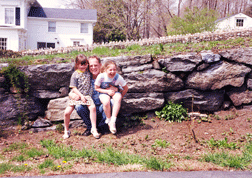
|
Volume 16, Issue 42 - October 16 - October 22, 2008
|
|
Columns |
Commentary
Easy Money
 |
The writer’s husband and daughters in Mystic during its pre-gambling days. |
How one historic city gambled and lost
by Jane Elkin
Editor’s note: A referendum on the Nov. 4 ballot asks Marylanders to approve or reject “up to five video lottery licenses for the purpose of raising revenue for education.” Thousands of the 15,000 machines would come to Anne Arundel County, within a few miles of the Beltway — hence about a half-hour from Annapolis. The door is open for later referenda on more.
I used to live in Mystic, Connecticut, a former whaling seaport reminiscent of Annapolis. I had dreamed of living there since I first visited at 16, and it was my daughters’ favorite of all my husband’s duty stations. Leaving at the Navy’s behest was hard, but we hoped to return. Selling our historic home four years later would prove even harder, not just for emotional reasons but for economic ones as well.
Our time in Mystic was during the post-Cold War defense drawdown, when Electric Boat was building fewer submarines and decommissionings were outstripping repairs.
The only bright spot on the local economy seemed to be the new Foxwoods Casino on the Mashantucket Pequot Indian Reservation, about a half-hour drive from Mystic. Theirs was the first of its type in the nation: the Native American pathway to the modern American dream of affluence run amuck. The casino was rescuing many families from the welfare rolls and promised to infuse the local economy with the fast and easy money that makes Las Vegas look like an adult-rated Disney Land. I wasn’t thrilled at the prospect of gambling in our back yard, but I was at least grateful that it provided us with renters. They had come from Atlantic City to show the locals how it was done.
When we returned four years later to close on the sale of our house, we visited the casino more out of curiosity than desire to win. We’re not much for throwing our money away and can’t understand people who do so in the name of entertainment, but that’s their business. We intended to spend $20 and leave, but only after touring. It just so happened, though, that we hit the jackpot in the second room we entered, the blackjack parlor.
Not 20 feet past the threshold, I saw a crisp $20 bill in the middle of a major thoroughfare. Cocktail waitresses and gamblers walked past it while I struggled with a moral dilemma. My impulse was to return it, the way you do when the shopper in front of you drops money at the checkout counter. Except I couldn’t tell who it belonged to. Offering it to the lost and found was pointless. Then the absurdity of the situation hit me, and I pointed to it just as I once had pointed to a mouse on the dance floor. It seemed comically out of place and sure to cause a scene when someone noticed.
Then I whispered to my husband, “Honey, there’s a $20 bill on the floor … right there.”
“You’re right. It is a $20 bill,” he said, somewhat louder than necessary. “Gee, I wonder who lost it?” He picked it up and held it to the light to examine it closer, but no one noticed. I imagined the stampede that would ensue if he broadcast it, like walking into an AA meeting with a bottle of liquor and asking who dropped it in the parking lot. He pocketed it, we watched some more and left as winners without having gambled a cent.
Ten years later, I passed through Mystic and was dismayed at the change. A friend had told me things just weren’t the same, but I wasn’t prepared. Mystic had lost its sparkle, and the neighboring industrial area looked downright depressed. I stayed in a hotel that used to cater to families visiting the Historic Seaport and Whaling Museum. Now the guests in the breakfast room looked hung-over and downtrodden as they shuffled into the dining room all disheveled. They rubbed their red eyes, smoking cigarettes and sipping coffee, and yawped to each other about the previous night’s action at the gaming tables. They let their neglected-looking kids run wild until the noise level prompted a sharp bark and scared submission. The whole scene made me sad. I didn’t want these people in my old hometown. They didn’t deserve a place as nice as Mystic.
I’ve been to Vegas and Atlantic City, and the more I see, the more it seems to me that gambling is to a depressed community what street drugs are to a depressed person. Both capitalize on human weakness by offering a quick fix that inhibits real healing and growth while fostering dependence on the pusher. I hope I never see Annapolis become another Mystic.